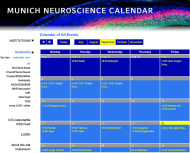Research group jointly supported by Roche and MCN-LMU
Group leader: Dr. Stefan Stricker
27.01.2017
The Stricker Lab: Roche MCN Research Group
 The research aim of our research group is to investigate, which of the myriad of epigenetic marks have significant functional relevance in mediating brain stem cell or disease phenotypes.
The research aim of our research group is to investigate, which of the myriad of epigenetic marks have significant functional relevance in mediating brain stem cell or disease phenotypes.
The award of the Roche-MCN junior research group allows us to benefit from the excellent work environment at the Munich Center for Neurosciences (MCN) while profiting from interactions with ongoing translational research at Roche. Physically placed at the newly opened BioMedical Center (BMC) we are in a place second to none to address a key question of molecular brain research: How are neural cell identity and diseases epigenetically controlled?
Recently, we, and others, have demonstrated that lineage reprogramming to pluripotency through forced expression of reprogramming transcription factors (termed induced pluripotent stem cell [iPSC] technology) can be applied to study epigenetic mechanisms in human brain cancers (Stricker et al., 2013; Stricker and Pollard, 2014). Such experimentally induced reprogramming can reveal how relevant cancer-specific and lineage-associated epigenetic changes are to maintain the malignant cellular state, but this approach is limited to widespread epigenomic changes. Therefore, we are currently using methods based on variants of the bacterial protein Cas9, to edit the cellular epigenome in an unprecedented and surgically manner (“epigenome editing”). These technologies allow manipulating individual chromatin marks (Stricker et al., in press), and even conducting epigenetic screens (Koferle et al., in press). Applying it to cellular models of neurobiology, we hope to find out how epigenetic mechanisms control brain cell features and how they contribute to neural diseases.


